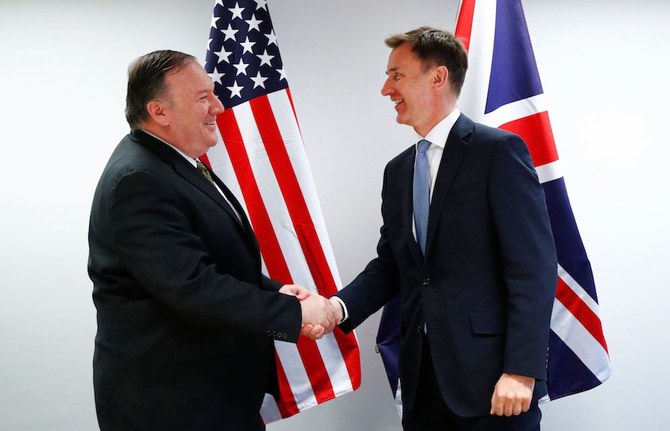BRUSSELS: Iran and the United States could trigger a conflict by accident in an already unstable Gulf region, Britain’s foreign minister said on Monday, as US Secretary of State Mike Pompeo held talks in Brussels with the main European powers on the crisis.
President Donald Trump is seeking to isolate Tehran by cutting off its oil exports after pulling out of a 2015 deal aimed at curbing Iran’s nuclear program. Trump has also beefed up the US military presence in the Gulf to pressure Iran.
While the European Union shares some US concerns about Iran, including over its involvement in the Syrian conflict, it still backs the 2015 nuclear deal, saying that it is in Europe’s own security interests.
“We are very worried about a conflict, about the risk of a conflict ... of an escalation that is unintended,” Britain’s Jeremy Hunt told reporters in Brussels ahead of the talks with Pompeo.
Britain, Germany and France are signatories to the 2015 deal and their foreign ministers were holding separate meetings in Brussels on Monday with Pompeo, who canceled a planned stopover in Moscow in order to brief the European allies on Washington’s latest moves.
Trump, who wants to force Tehran to agree a broader arms control accord, has sent an aircraft carrier and B-52 bombers to the Gulf in a show of force against what US officials have said is a threat to US troops in the region.
Iran says the strategy amounts to “psychological warfare” and a senior Iranian Revolutionary Guards commander on Sunday said Iran would retaliate to any aggressive US moves.
“TAKING DIFFERENT COURSES“
The US State Department billed Monday’s talks in Brussels as a chance “to discuss recent threatening actions and statements” by Iran.
German Foreign Minister Heiko Maas said he had told Pompeo during their Monday meeting: “We do not want it to come to a military conflict (between the United States and Iran).”
Maas avoided any public criticism of Washington, saying both sides wanted to ensure peace in the Middle East. But he said it was clear that Europe and the United States were “going about it in different ways ... taking different courses.”
Before his meeting with Pompeo, France’s Foreign Minister Jean-Yves Le Drian urged Europeans to remain united in support of the nuclear deal, which was signed by the United States, Britain, France, Germany, China and Russia, and which the European Union helped to negotiate.
For Europe, the tensions with the Trump administration mark a deepening split in transatlantic ties that were traditionally marked by close coordination on Middle East policy, despite sharp disagreements over the 2003 Iraq war.
Iranian President Hassan Rouhani warned last week that Tehran could resume enrichment at a higher grade if the European powers, China and Russia did not do more to circumvent punitive US measures on banking and energy to boost trade.
Hunt, who held talks with Maas and Le Drian on the margins of a regular EU meeting in Brussels, expressed concern about the risks of a nuclear arms race in the Middle East if Iran were to acquire such weapons.
“We need to make sure that we don’t end up putting Iran back on the path to re-nuclearization,” Hunt said, calling for “a period of calm so that everyone understands what the other side is thinking.”
EU foreign policy chief Federica Mogherini said the EU would continue to support the nuclear pact because Iran continued to comply with inspections and uranium production limits.
The EU is trying to implement a new channel to allow Iran to sell its oil and circumvent newly-instated US sanctions, but setting it up is proving complex.
Spain’s Foreign Minister Josep Borrell said Madrid was considering joining the special trade channel, known as INSTEX, which so far counts France, Germany and Britain as shareholders and could be operational by the end of June.


Britain warns of Iran-US conflict, Pompeo meets Europeans
Britain warns of Iran-US conflict, Pompeo meets Europeans

- Europe urged US not to further escalate tensions over Iran nuclear deal, with UK issuing a stark warning of risk of conflict
- Pompeo met counterparts from the 3 European signatories to the 2015 accord that curbed Iran’s nuclear ambitions in return for sanctions relief
Thai military plane crash kills two pilots

BANGKOK: A military plane crashed in a forested area of northern Thailand during a training flight on Thursday, killing the two pilots on board, the air force said.
“Two pilots died in an aircraft accident involving a light attack aircraft AT-6TH this morning during training,” air force spokesman Jackkrit Thammanvichai said.
The two-seater plane crashed in Chiang Mai province at around 10:20 am (0320 GMT) during a combat search and rescue training mission, the air force said in a statement.
The crash “did not affect local residents or cause damage to civilian property,” the statement said.
Authorities were investigating the cause of the crash and had deployed to the scene, it added.
Six Thai police officers were killed in April last year when a small plane crashed into the sea during a parachute training drill near a resort town south of the capital Bangkok.
“Two pilots died in an aircraft accident involving a light attack aircraft AT-6TH this morning during training,” air force spokesman Jackkrit Thammanvichai said.
The two-seater plane crashed in Chiang Mai province at around 10:20 am (0320 GMT) during a combat search and rescue training mission, the air force said in a statement.
The crash “did not affect local residents or cause damage to civilian property,” the statement said.
Authorities were investigating the cause of the crash and had deployed to the scene, it added.
Six Thai police officers were killed in April last year when a small plane crashed into the sea during a parachute training drill near a resort town south of the capital Bangkok.
© 2026 SAUDI RESEARCH & PUBLISHING COMPANY, All Rights Reserved And subject to Terms of Use Agreement.












